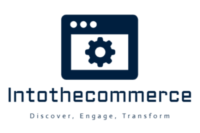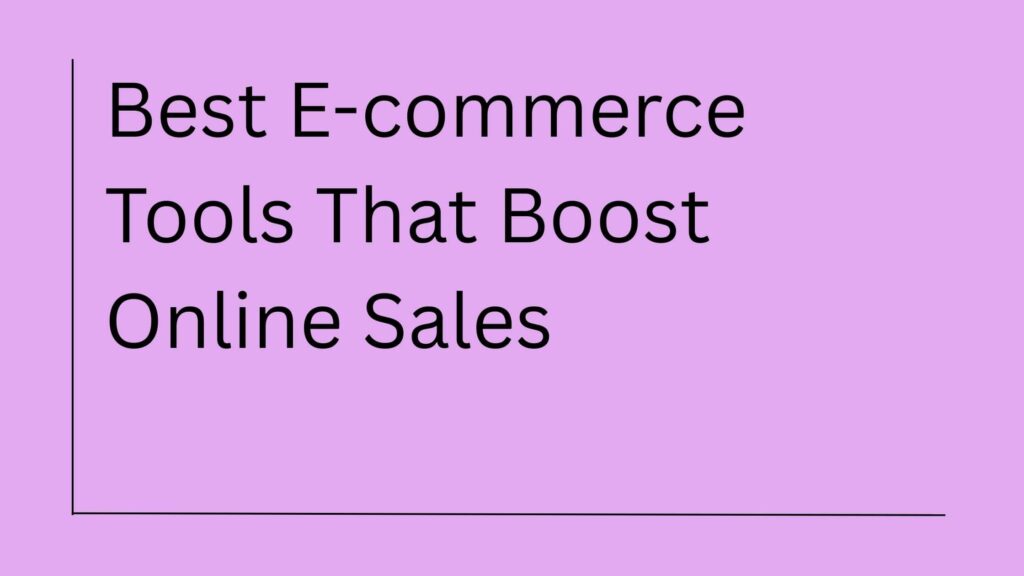Starting an ecommerce business is an exciting venture, but it’s no secret that it can be overwhelming, especially if you don’t have the right tools in place. With so many aspects to consider, from setting up your online store to managing payments, inventory, marketing, and customer relationships, you need a solid toolkit to streamline your processes and ensure that everything runs smoothly. Fortunately, the ecommerce world is packed with tools designed to make the life of an online business owner easier and more productive.
In this article, we’ll take a deep dive into the best ecommerce tools that can help drive more online sales.
Let’s get started!
Top 6 Ecommerce Tools to Help You Sell More Online
The following tools are essential for businesses looking to scale, optimize their processes, and ultimately boost their revenue. Whether you’re just starting out or looking to refine your operations, these tools will help you build a strong foundation for success.
1. Shopping Cart Platform: The Backbone of Your Online Store
The shopping cart platform is one of the first things you’ll need to choose when setting up your ecommerce business. It’s the core software that allows you to sell products online, manage customer orders, process payments, and integrate shipping solutions. Without a reliable platform, your online store will face operational hiccups, which can lead to frustrated customers and lost sales.
The ideal shopping cart platform should offer a comprehensive solution that covers product management, payment processing, customer management, and security. There are several robust ecommerce platforms to consider, including:
- Shopify: One of the most popular ecommerce platforms, Shopify is known for its ease of use, flexibility, and a wide range of themes and apps. It supports businesses of all sizes and allows users to set up a fully functional online store with minimal technical knowledge. Shopify also integrates with various payment processors and provides a host of marketing tools.
- BigCommerce: BigCommerce is another top contender that offers advanced features, making it perfect for businesses looking to scale. It’s particularly well-suited for larger stores with a large inventory and high transaction volumes. BigCommerce comes with built-in SEO tools, shipping integrations, and detailed analytics to help you grow your business effectively.
- WooCommerce: If you’re using WordPress, WooCommerce is a great option for turning your site into a fully functional online store. It’s open-source, highly customizable, and offers a wide variety of extensions to meet your specific business needs.
When choosing your platform, think about the size of your business, your technical expertise, and the specific features you need (such as multi-currency support, mobile optimization, or integrations with other tools).
2. Payment Processor: Secure and Reliable Transactions
One of the most critical elements of an ecommerce store is how it processes payments. You need a trusted payment processor to handle customer transactions securely. A reliable payment processor ensures that your customers can pay with ease, whether using a credit card, debit card, or digital wallet. It also helps protect both you and your customers from fraud, offering features like encryption and fraud detection.
Some of the best payment processors for ecommerce stores include:
- PayPal: PayPal is one of the most widely used payment gateways across the world. Its familiarity and ease of use make it a popular choice for both businesses and consumers. It also provides additional features like recurring billing and multi-currency support.
- Stripe: Stripe is another highly popular payment processor known for its developer-friendly API. It’s easy to integrate with your store, offering features like subscription billing, mobile payments, and fraud protection. Stripe also supports a wide range of payment methods, including credit cards, digital wallets (like Apple Pay and Google Pay), and even ACH transfers.
- Square: Square is a versatile payment processor that can handle both online and in-person payments. It’s ideal for businesses that have physical locations or pop-up shops, as it offers a seamless point-of-sale (POS) system. Square’s user-friendly interface and transparent pricing make it a popular choice for small to medium-sized ecommerce businesses.
When selecting a payment processor, consider factors like transaction fees, ease of integration with your ecommerce platform, customer support, and any international payment capabilities you might need as your business grows.
3. Inventory Management Software: Keep Track of What You Sell
Effective inventory management is essential for ecommerce businesses, especially if you’re dealing with large volumes of products. Having the right inventory management software helps you track stock levels, automate order fulfillment, and reduce the risk of overstocking or stockouts.
Inventory management software can save you time and help you optimize your operations by:
- Providing real-time visibility into stock levels.
- Sending alerts when it’s time to reorder.
- Generating purchase orders automatically based on demand.
- Automating labeling and shipping processes.
Some of the best inventory management tools for ecommerce businesses include:
- TradeGecko (now QuickBooks Commerce): TradeGecko is a powerful inventory management system designed specifically for ecommerce businesses. It allows you to track stock levels, automate purchase orders, and manage multiple warehouses. Its integration with Shopify and other platforms makes it an easy addition to your ecommerce toolkit.
- Cin7: Cin7 is a cloud-based inventory management solution that integrates with popular ecommerce platforms like Shopify, Amazon, and eBay. It offers features like stock level tracking, demand forecasting, and real-time order tracking.
- NetSuite ERP: For larger businesses or those that require advanced features, NetSuite ERP is an all-in-one enterprise resource planning system that includes robust inventory management capabilities. It’s suitable for businesses with complex inventory needs, multiple warehouses, and advanced reporting requirements.
Choosing the right inventory management software will depend on the size of your business, the number of products you sell, and your operational complexity. Having the right system in place will not only help you avoid costly mistakes but also give you more time to focus on growing your business.
4. Email Marketing Tools: Stay Connected with Customers
Email marketing remains one of the most effective ways to build relationships with customers and drive sales. By collecting customer emails and segmenting your audience, you can send personalized messages that encourage repeat business, promote new products, or offer exclusive discounts.
Here are a few of the best email marketing platforms for ecommerce:
- Mailchimp: Mailchimp is a highly popular email marketing tool that is perfect for small businesses just starting out. It offers customizable email templates, automation workflows, and analytics to track the performance of your campaigns. You can also integrate Mailchimp with ecommerce platforms like Shopify and WooCommerce to send targeted campaigns based on customer behavior.
- Klaviyo: Klaviyo is an advanced email marketing platform designed specifically for ecommerce businesses. It allows you to create highly personalized campaigns based on customer data, such as past purchases, browsing behavior, and location. Klaviyo also offers powerful segmentation tools and integrations with various ecommerce platforms.
- Constant Contact: Known for its ease of use, Constant Contact is ideal for beginners. It provides customizable email templates, automation tools, and a simple interface for managing contacts and campaigns. It’s also packed with useful features like list segmentation and A/B testing.
With the right email marketing tool, you can automate follow-up emails, cart abandonment reminders, and loyalty programs to drive more sales and keep your customers engaged.
5. Social Media Advertising: Amplify Your Reach
Social media platforms like Facebook, Instagram, and Pinterest offer powerful advertising tools that can help you expand your reach and generate more sales. These platforms allow you to target highly specific audiences based on demographics, interests, and behaviors, so you can promote your products to the right people at the right time.
Some of the most effective social media advertising tools include:
- Facebook Ads: Facebook offers a variety of ad formats, from photo and video ads to carousel and slideshow ads. You can target specific audiences based on their behavior, location, and interests. Facebook’s advertising tools also allow you to track performance, optimize campaigns, and retarget visitors who have interacted with your website or products.
- Instagram Ads: Since Instagram is owned by Facebook, its advertising platform is seamlessly integrated with Facebook Ads. Instagram is especially powerful for ecommerce businesses in the fashion, beauty, and lifestyle industries, as its visual nature allows businesses to showcase their products in an engaging way.
- Pinterest Ads: Pinterest is a highly visual platform with a dedicated audience of shoppers. If your products are visually appealing, Pinterest Ads can be a great way to drive traffic to your online store and increase sales.
Social media advertising offers a cost-effective way to reach new customers, build brand awareness, and drive traffic to your store. It’s highly measurable, meaning you can track your ROI and adjust your campaigns for better results.
6. Ecommerce SEO Tools: Get Found on Google
Search engine optimization (SEO) is essential for driving organic traffic to your website. The right SEO tools can help you optimize your site for search engines like Google, allowing you to increase visibility and drive more sales.
Some of the best SEO tools for ecommerce businesses include:
- Ahrefs: Ahrefs is a comprehensive SEO toolset that provides features like keyword research, backlink analysis, and site auditing. You can use Ahrefs to identify the best keywords to target, optimize your product pages for search engines, and analyze competitors’ SEO strategies.
- SEMrush: SEMrush is another powerful SEO tool that allows you to track your keyword rankings, monitor backlinks, and analyze competitors. It also provides site audit tools that can help you identify areas for improvement in your store’s SEO.
- Moz: Moz offers a suite of SEO tools that can help you optimize your ecommerce site for search engines. It includes keyword research, link building, and rank tracking features, making it a great tool for improving your store’s search engine visibility.
By using ecommerce SEO tools, you can improve your site’s rankings on Google, drive more organic traffic, and ultimately increase sales without having to rely on paid advertising.
Wrapping Up: Choosing the Right Tools for Your Ecommerce Success
So, running a successful ecommerce business requires more than just a great product or service; it takes the right tools to streamline your operations, manage your finances, and engage with customers. Whether you need an ecommerce platform to build your store, a payment processor to handle transactions, or inventory management software to keep track of stock levels, there are plenty of tools available to help you succeed.
By investing in the right ecommerce tools, you can save time, reduce errors, and focus on growing your business. Don’t hesitate to experiment with different tools until you find the perfect combination that works for your unique needs. And remember, as your business grows, you can always expand and integrate new tools to keep up with demand and continue driving sales.
Start small, think big, and grow with confidence. Happy selling!

The Chief Author and Editor at Intothecommerce. As a seasoned expert in digital marketing, I direct the site’s strategic content and ensure every piece meets the highest industry standards. My insights drive our coverage on SEO, paid media, and cutting-edge marketing technology.





1 thought on “6 Best Ecommerce Tools That Help in Driving More Online Sales”
Thank you for your information. I definitely agree that the post could benefit from a discussion on how the challenges of selecting e-commerce tools can affect the overall context. Adding this aspect would provide a more comprehensive understanding of the topic, and I believe it would be valuable for readers seeking a deeper insight into the implications of decision-making in e-commerce tools.